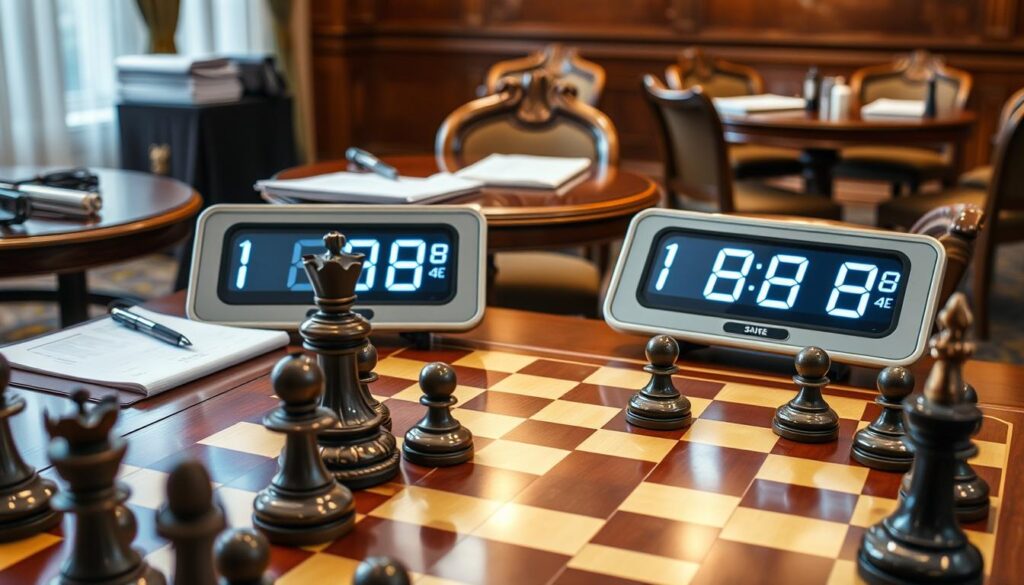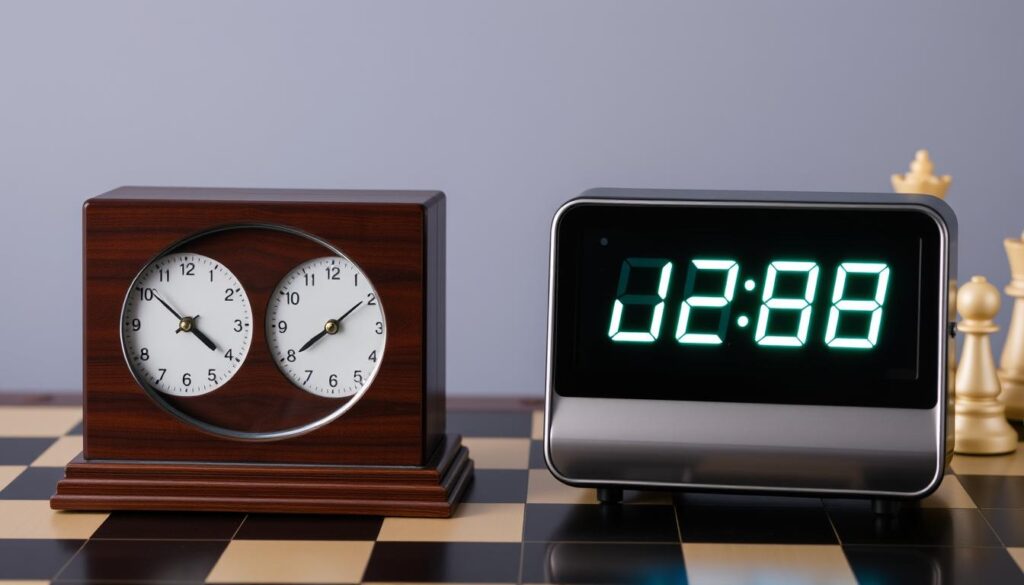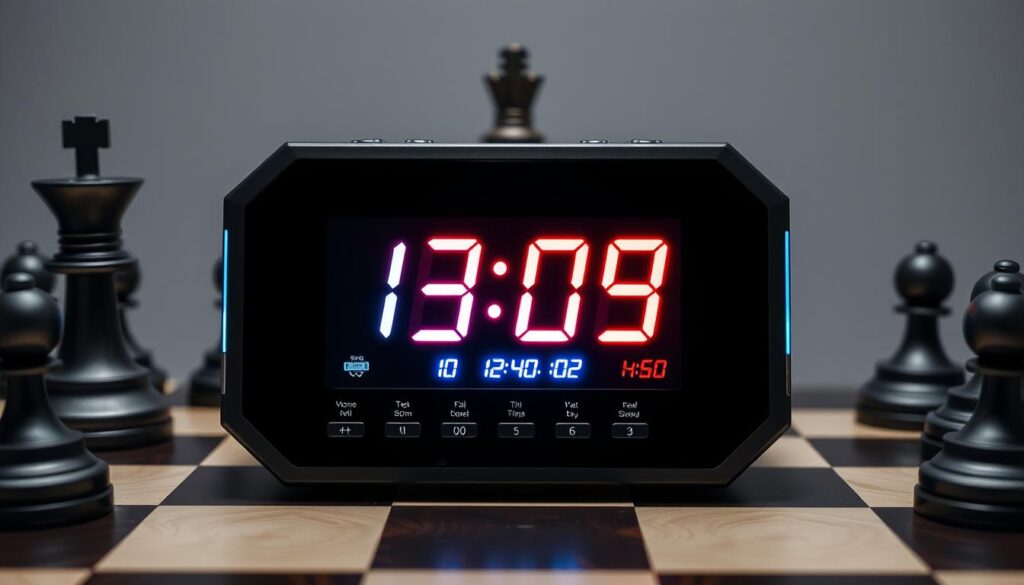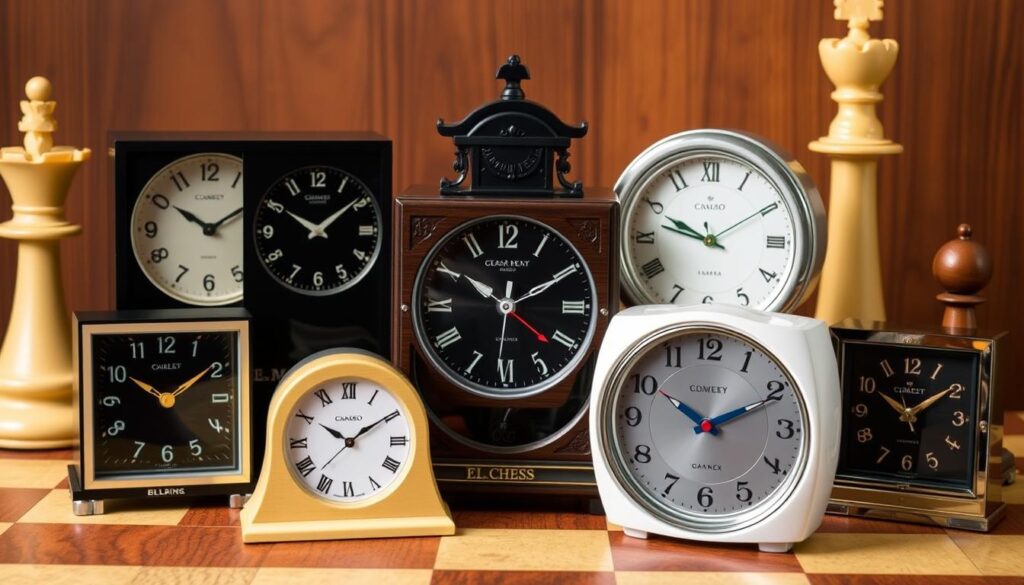I still remember the excitement of my first tournament game. The sound of the clock ticking, my opponent’s moves, and the pressure to act fast. Chess is more than strategy; it’s about discipline, focus, and time management.
Chess clocks are key to turning a casual game into a real challenge. They help players of all levels show their skills. Finding the right chess clock can greatly improve your game.
In this guide, we’ll look at chess clocks from simple to advanced models. You’ll see how important they are in chess tournaments. And how to pick the best one for your game. Let’s find the perfect chess clock for you.
Table of Contents
Understanding Chess Clocks: Essential Tournament Equipment
As a chess player, you know strategy and skill are key. But time management is also crucial. Chess timers, or clocks, help with this. They are vital for players of all levels, improving time use and quick thinking.
When picking a chess timer, think about its purpose, style, size, and material. It should meet your needs and fit your budget. Digital chess clocks are now preferred for their clear displays and ease of use.

Tournaments often use increment or delay features. These give players extra time per move, up to 30 seconds. Increment is more common, especially in FIDE tournaments. Recreational games might have different time settings, like a “5-minute blitz game.”
In critical positions, managing time is key. Timed games ensure a clear end, preventing games from going on too long. Players must follow chess etiquette, like not announcing when time runs out and reporting issues to the TD.
Analog vs Digital Chess Clock: Making Your Choice
Choosing between analog and digital chess clock depends on your style and preference. Analog chess clocks, like the INSA Wooden Mechanical Chess Clock, have a vintage charm . They are simple and great for beginners. These clocks are easy to use and quiet.
Digital chess clocks, such as the DGT 3000, have advanced features. They offer pre-set timing and are good for online or PC games. These clocks are popular among experienced players and tournament organizers.

Deciding between an analog chess clock and a digital chess clock is personal. Analog clocks give a classic feel, while digital clocks offer more features. Think about what you need, your budget, and your chess goals to choose wisely.
Premium Features in Modern Chess Clocks
The chess world keeps changing, and so do the tools players use to get better. Modern chess clocks now have many premium features that can really improve your game. From the famous DGT clock chess to smart technology, let’s look at what today’s advanced timers offer.
The DGT 3000 Digital Chess Clock is a great example of how technology has changed the chess clock. It looks sleek and wooden, yet it’s full of modern features. It has dozens of timing settings for quick setup and can connect with DGT e-boards for online chess.
If you want the latest in smart tech, check out the Zmart Tap N Set Pro Digital Chess Clock. It uses NFC technology, so you can set it up from your phone. It’s the official chess clock of the US Chess Federation, offering a top-notch experience for competitive players.

Whether you’re a pro tournament player or just love chess, modern clocks have a lot to offer. They provide precise timekeeping, versatile settings, and digital integration. These tools are set to change how you play chess.
Popular Chess Clocks for Different Skill Levels
Whether you’re just starting out or have been playing chess for years, there’s a chess clock for you. The DGT 1002 Bonus Game Timer is great for beginners. It’s easy to use and has simple features perfect for new players.
For those who play a lot or are professional chess players, the ZMF Pro Clock is a top pick. It has lots of advanced features for serious chess fans. Schools and clubs might like the DGT 1001 Game Timer for tracking time and helping players get better.
The Zmart Tap N Set Pro is the official US Chess Federation clock. It’s good for both beginners and experienced players. Its smart features and manual options make it versatile for many chess players. No matter your skill level, there’s a chess clock brand that can improve your game.

Investing in Your Perfect Chess Timer: Budget to Professional
Chess clocks come in many prices, fitting all budgets and skill levels. It’s key to balance cost with quality for lasting value. Basic timers are affordable, while top models offer better build, precision, and features for tournaments.
Think about durability and where you’ll use the clock. Clubs or homes with kids and pets need sturdy clocks. Your choice should match your skill, playing space, and chess dreams.
Every player, from casual to competitive, can find a chess clock that fits. The market has many options, from cheap to expensive. With the right choice, your game will improve and your chess journey will be better.
FAQ
What are chess clocks, and why are they essential for players?
Chess clocks are key for both casual and competitive players. They keep the game pace fair and help manage time. This skill is useful in chess and everyday life.
What factors should I consider when choosing a chess clock?
Look at the clock’s purpose, style, size, and material. It should fit your needs and budget. Quality and durability are important.
What are the differences between analog and digital chess clocks?
Analog clocks are simple and great for beginners. Digital clocks have advanced features and are better for online games. Choose based on your style and needs.
What are some premium features in modern chess clocks?
Modern clocks have tournament displays and pre-set times. They also connect to DGT e-boards for online play. Some even use smart tech for setup.
What chess clocks are recommended for different skill levels?
There’s a clock for every skill level. Beginners might like the DGT 1002 Bonus Game Timer. The ZMF Pro Clock is for pros. The DGT 1001 Game Timer is good for clubs and schools. The Zmart Tap N Set Pro is great for all players.
How do I determine the right budget for a chess clock?
Chess clocks range from affordable to expensive. Choose quality over price. Budget clocks are basic, while premium ones offer more features. Think about durability, especially if you have kids or pets.

















